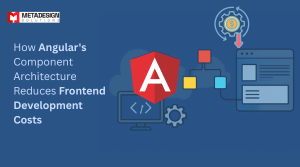The latest version of Angular 18, the TypeScript-based web framework, brought a lot of cool features to the table with its update. The new version is closer to the IVYish vision. We can say that IVY is a modern and cutting-edge technology that offers a quick AOT compilation.
The new update has better router performance and stricter sorts. Apart from these, there were some significant updates that you cannot overlook if you are looking to try out Angularjs development services. Some of which were:
Ivy in Angular
It has been a long time since the community of Angular was trying to get developers to combine Ivy and Angular. This resulted in the creation of a methodology called “IVY EVERYWHERE.” Moreover, the developers have deprecated the View Engine, which means no future updates will have it.
Developers are happy to have it, as it will remove the clutter when they are delivering Angular development services to their clientele.
Relocating Away from i18n Framework Message IDs
The Angular team is shifting from the traditional message IDs of the i18n framework, as the traditional legacy message IDs were a bit delicate. The current IDs are more durable and natural. This means that the translation invalidation will be significantly reduced when translations do not coordinate with whitespace changes.
Build Cutting-Edge Apps with Angular
Ready to update your app with Angular’s newest features? Contact us now to explore how we can upgrade your project with the latest Angular tools and optimizations.
Discarding IE11
We all know that Angular keeps on upgrading itself as the web ecosystem evolves. When we halt the support for legacy browsers, we see the development of modern and improved solutions. With the next upgrade, Angular 18 will no longer support IE11.
The Strict Mode by Default
In Angular 12, the strict mode comes in by default within the Angular CLI as a feature. With the Strict Mode, you get better assistance while debugging and enhancing maintainability. Apart from this, the applications of the strict mode can help the ng update command pretty accurately and securely. Moreover, you can statistically examine your strict mode application.
Default Production Build
With the default production build, the ng command will help avoid building and transporting development to the production ecosystem. Earlier, with ng builds, we had to manually run the ng build command to better optimize the development build.
Numerous Improvements in HTTP
There have been a lot of improvements in the HTTP support in this new update, some of which are:
- HttpStatusCode: We see a bunch of HTTP status codes as const enum in Angular 12. Now, we can use the HttpStatusCode instead of names, which are readable by humans.
- appendAll on HttpParams: You can use the appendAll technique to add a group of boundaries without any delay.
- Metadata for Interceptors and Requests: Now, we can use the HttpClient to store and recover personalized metadata. This can immensely help the HTTP interceptors a lot.
New Dev Tools
The news of Angular Dev Tools for Google’s Chrome browser has been made after releasing Angular 18. Now, the embedded profile can detect as well as monitor the activities that are taking place. These tools are also compatible with IVY, making it a significant upgrade from the previous version. An Angular JS development company can get a lot of benefits from this.
Angular Universal
One of the most significant enhancements you can witness in this version of Angular is the Inline critical CSS, which is present in the nguniversal/common by default. Also, we can see that Angular Universal is supporting the proxy configuration in the SSR-dev-server builder. We can also see the introduction of a new SSR engine called Clover.
TypeScript 4.2
With the stable version release of TypeScript 4.2, we see some significant features in the framework. These updates not only enhance the developer experience but also bring powerful tools for building applications using TypeScript with React Native and Angular.js. Some of the key changes TypeScript 4.2 has introduced are:
- Abstraction of construct signatures
- Alterations in the Tuple Types
- Improved functionality for the in-operators
- Massive improvement in the compile process
- Improvement in the Type Alias
- Webpack 5.37 support
What Are We Missing?
Each year, Angular gets requests from various communities to add certain features. There is no denying that the new features added in this update are undoubtedly some of the best additions to Angular. However, we are still missing some of the most needed features, and many of these are in the development phase, making the future of Angular quite bright.
Improved Developer Ergonomics by Using Strict Typing
With a stricter check for reactive forms, developers will have a window to find more issues they otherwise missed during development time.
Enhanced Debugging Options and Test Times
With the help of automated testing, there will be enhanced test times and improved isolation for all the tests. Now, the TestBed will be able to tear down the test environments after each test is performed and clean out the testbed.
Minimal Framework Overhead
We can achieve lower complexity within the codebase, a smaller package, and lower maintenance costs by removing the legacy View Engine for Angular conceptual overhead.
Supporting Directives to Host Elements
With this, developers will be able to add behavior to their components with no inheritance, making it easier to work with reusable components.
Splitting APIs
Web applications have a slow load time. However, you can improve the load time by applying granular code-splitting at the component level.
Optional NgModulars
You can now develop standalone components with NgModulars. Moreover, you can also declare the compilation scope of the component by implementing an alternative API.
Angular Compiler PlugIn
With the Angular Compiler as a plugin, you can now enhance build performance and reduce the cost of maintenance.
Conclusion
If you are someone who has been using Angular from its initial days, you might have seen the progress it has made. There have been plenty of phases while coming this far with the framework. However, at last, we have fun using a modern framework that is still looking to become better.
Angular might have lost its shine with the rise of other frameworks like Vue, React, etc. But with constant upgrades, bug fixes, and the launch of Angular 18, Angular has a long way to go. With its powerful features such as server-side rendering, dependency injection, angular material, data binding, and much more, it continues to be a top choice for building single page applications and progressive web apps.
With the latest version of Angular 18, we have a stable and better framework, and who knows what the Angular developers have stored for us? To get more information on Angular, contact an Angular JS development company, and get the best results.
Related Keyphrase:
#Angular #AngularUpdates #AngularDevelopment #WebDevelopment #AngularFramework #AngularNewFeatures #AppDevelopment #AngularServices #AngularDevelopmentCompany #FrontendDevelopment #AngularJS #TechSolutions #HireAngularDevelopers #AngularAppDevelopment #AngularAppDevelopmentCompany #CustomAngularDevelopment #AngularExperts #AngularFeatures #SoftwareDevelopment #WebAppDevelopment #AngularDevelopmentServices #HireFrontendDevelopers #TechInnovation #AngularDevelopmentServices #HireTechExperts #FrontendTech #AngularComponents #WebDevelopmentCompany #AngularConsulting #TechInAngular #AngularBestPractices #AngularServicesCompany #WebAppSolutions #CustomAppDevelopment #AngularFrameworkServices #AngularAppSolutions #FrontendSolutions #AngularUpdates2022 #WebDevelopmentExperts #AngularCommunity #HireAngularExperts #AngularWebDevelopment #SoftwareDevelopmentServices #TechConsulting


